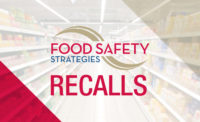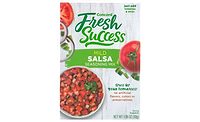For the second time this year, Food Safety Magazine has tracked food recalls announced by the U.S. Food and Drug Administration (FDA), U.S. Department of Agriculture (USDA), U.S. Centers for Disease Control and Prevention (CDC) and the Canadian Food Inspection Agency (CFIA) from April 1, 2015 through June 30, 2015. In total, 163 separate recalls were tallied--a 17 percent decrease compared to the previous quarter.
Misbranding and Undeclared Allergens -- 44% of recalls
Nearly half of this quarters recalls stemmed from undeclared allergens, although not quite as many as last quarter’s 57 percent. While the first part of the year revealed that most of the allergen recalls were related to peanuts, those numbers dipped sharply from 31 to just 6. This time, the most common allergen was milk--accounting for nearly 30 percent of all undeclared allergens this quarter.
What’s interesting about the bulk of the milk allergen recalls is the type of products that were affected. Approximately 20 percent of milk allergens were found in beef products--beef jerky, blintzes (ethnic pancakes) and meatballs. Candy, gum and coconut milk powder were also common foods containing undeclared milk this quarter.
Undeclared allergens by the numbers:
Milk: 21
Eggs: 13
Soy: 11
Wheat: 9
Sulfites: 8
Peanut: 6
Mustard: 3
Cashew: 2
Fish: 2
Walnut: 2
Coconut: 1
Hazelnut: 1
Sunflower seeds: 1
Gluten: 1
Allergen Mix Up
In late June, the UK’s Food Standards Agency was forced to recant a previously issued recall on ground cumin after initial reports of it containing almond protein--an allergen--turned out to be false. The ground cumin--recalled between January and March--actually contained traces of a spice called mahaleb which was not listed on the product label. Mahaleb and almond originate from the same plant family, hence the false readings in initial allergen tests.
Listeria - 15% of recalls
The second most common culprit behind this quarter’s recalls was Listeria, which experienced a slight uptick versus last quarter’s 11 percent. By and large, the most common foods affected were chicken products, raw soybean and mung bean sprouts, ice cream and mushrooms. This category also had quite a few major brands that had to issue recalls--Costco Wholesale Canada Inc., Blue Bell Creameries, Sabra Dipping Company and Jeni’s Splendid Ice Creams.
Salmonella - 12% of recalls
There was a dip in the number of food recalls caused by Salmonella, which accounted for 14 percent of last quarter’s recalls. The bulk of these recalls--half of them--were traced back to nuts. Although raw pine nuts, cashews and walnuts were all found to be sources of contamination, half of this quarter’s Salmonella recalls were traced back specifically to macadamia nuts--some recalled from major retailers like Whole Foods Market. No suppliers were specifically named in any of the recall notices. Dog food was the second most common cause of Salmonella contamination.
E. coli Recalls - 4% of recalls
Out of six Escherichia coli recalls, four of them were linked to beef. Last quarter, just two recalls were caused by E. coli contamination.
The most publicized E. coli recall occurred just days ago when 14 generic bottled water brands--including 7-Eleven, Shop Rite and Wegman’s--were recalled due to the presence of E. coli. Oddly, no formal release was published by the FDA, USDA, CDC or CFIA the agencies that typically notify the public of food recalls. Lauren Sucher, a spokesperson for the FDA told USA Today that “Niagara’s recall was voluntary but was still being monitored by the agency.”
Staphylococcus Recalls - 4% of recalls
Staphylococcus recalls also grew in number from two last quarter to seven this time around. Five of the recalls were caused by Staphylococcus aureus and were linked to cheese and hummus. Another cheese recall was only said to be caused by Staphylococcus bacteria with no specific strain identified. A recall caused by the enterotoxic strain was linked to pork.
Possible Foreign Matter Contamination Recalls - 4% of recalls
In the case of possible foreign matter contamination, these types of recalls--at least in Q2--always involved some variety of meat or poultry. Two beef recalls (including the well known Cargill brand and one Georgia Bi-Lo Supermarket store) and one each for sausage, chicken and sweet potato baby food (Beech-Nut brand) and pork were all responsible for more than 152,000 pounds of meat recalls due to the presence of blue string, small pieces of glass or plastic, and what’s vaguely been described as “foreign materials” in pork products.
Big Brand Busts
Although Blue Bell Creameries originally issued their all-inclusive product recall in March (Q1), an expansion of the recall to include products manufactured at the company’s Broken Arrow, OK plant was issued in April.
In June, Nestle India vowed to destroy $50 million worth of Maggi brand instant noodles after tests revealed alarmingly high levels of lead--an allegation Nestle has refuted. The company’s five noodle plants were shut down due to safety concerns. The snack is an extremely popular staple among India’s student and young adult population.
As of June 30, an Indian court granted Nestle permission to export Maggi noodles manufactured there, but the product still is not suitable for sale in India. The reason for this is because it is generally up to the receiving country to determine whether or not a product is safe for consumption before distributing it to their citizens. Tests of Maggi noodles performed by officials in Singapore found the product to be safe. The FDA has said it will test the imported noodles. As of July 5, the CFIA’s food safety investigation did not find any health risk associated with the consumption of Maggi noodle products sold in Canada. India has reportedly had more snack imports rejected from the U.S. than any other country so far this year, mainly due to pesticides, Salmonella and unsanitary storage conditions. Court proceedings regarding the future sales of Nestle’s Maggi noodles will resume in mid-July.
A popular line of cat foods by Ainsworth Pet Nutrition were voluntarily recalled in early June. While Ainsworth might not be a household name, the line of feline treats is branded with the familiar name and face of Rachael Ray. At least five varieties of wet cat foods were pulled off shelves because of potentially high levels of vitamin D--too much of which can cause vomiting, diarrhea, increased thirst and urination, muscle tremors or seizures in cats.
Whoa, Baby
One of the most alarming types of recalls in Q2 involved a very delicate and sensitive category--infant formula and food. This quarter, three separate recalls lead to baby food being pulled off store shelves.
In mid-April, popular brand Beech-Nut recalled 4 oz. glass jars of the brand’s classic sweet potato and chicken variety due to the possible presence of foreign matter. The recall was issued after the company received a consumer complaint about a small piece of glass in the product. There was also at least one report of an oral injury associated with consumption of the recalled product.
Within hours, the next baby food recall was issued--this one by Heinz Canada. The brand’s chicken with broth baby food was pulled from shelves due to the potential loss of its safety seal, which could cause spoilage. One week later, the recall was expanded to include the brand’s sweet potato and beef medley variety.
In June, the CFIA was notified of possible product substitution or tampering when consumers began returning their purchased infant formula to retail stores for refunds. While the product packaging was still intact, there were instances of broken tamper-proof seals, along with containers filled with a different product brand or variety than what was displayed on the label. The agency contends that these types of recalls “are not typically associated with the manufacturing process”.
Produce in Peril
Additional cases of product tampering also occurred with bags of potatoes. In May, the CFIA notified consumers of nails and needles that appear to have been inserted into potatoes. The affected area appears to have been concentrated in Atlantic Canada. At the time of the recall, no confirmed illnesses or injuries were associated with the consumption of tampered potatoes.
Although it was officially classified by the FDA as a “possible health risk”, coconuts sold by Falcon Trading Company, Inc. dba Sunridge farms were voluntarily recalled due the possible presence of stainless steel wire--the kind used in the screening process during manufacturing. At the time the recall was issued, no illnesses had been reported.
Historically, food allergens have always been the leading cause of food recalls. What food manufacturers need to know is that these instances are almost always preventable. These sources of physical contamination--combined with those of microbiological and chemical origin--should be all the reason food manufacturers need to get their food safety systems in order. From cheap to expensive, the tools out there are far more affordable than the exorbitant costs of a recall.
Editor’s Note: Food Safety Magazine reviewed 163 food recalls that were announced during the second quarter of 2015. We are aware that additional recalls may have been released during this time that we did not account for.
References
http://www.fsis.usda.gov/wps/wcm/connect/FSIS-Content/internet/main/topics/recalls-and-public-health-alerts/recall-case-archive/archive/2015/recall-068-2015-release
http://www.food-safety.com/news/fsa-recalled-ground-cumin-did-not-contain-almond-protein/
http://www.usatoday.com/story/news/nation-now/2015/06/22/ecoli-recall-bottled-water/29136255/
http://www.fda.gov/Safety/Recalls/ucm443851.htm
http://www.food-safety.com/news/blue-bell-recalls-all-products-after-listeria-contamination/
http://www.food-safety.com/news/nestle-india-to-destroy-50-million-of-maggi-noodles/
http://www.fda.gov/Safety/Recalls/ucm449841.htm
http://www.fda.gov/Safety/Recalls/ucm447916.htm
http://www.food-safety.com/signature-series/controlling-allergens-in-food-manufacturing-plants/




